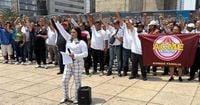On Wednesday, April 2, 2025, a significant megamarch organized by the Alianza de Transportistas, Comerciantes y Anexas de México (ACME) is set to take place, impacting mobility across both the State of Mexico and Mexico City (CDMX). The protest aims to highlight allegations of extortion and the fabrication of crimes by local authorities, particularly targeting the municipal president of Tlalnepantla, Raciel Cruz Pérez.
The march is expected to commence at 8:00 AM from various locations in the Valley of Mexico, culminating at Palacio Nacional in the heart of Mexico City. The organizers have made it clear that while they intend to conduct a peaceful demonstration, the scale of the event will inevitably lead to significant traffic disruptions.
Key routes that will be affected include major thoroughfares such as Eje Central Lázaro Cárdenas, Anillo Periférico Norte, Avenida Mario Colín, Boulevard Gustavo Baz, and areas near the Monumento a la Revolución. Motorists are advised to plan their journeys ahead of time to avoid congestion and delays.
ACME members have voiced concerns over alleged extortion by municipal authorities in Tlalnepantla, stating that they have been unjustly targeted by the local prosecutor's office. "If there is something against us, we ask to be summoned to defend ourselves, but no more unjust detentions of our members for supposed crimes," the group stated during a previous protest at the Monumento a la Revolución.
In their call to action, ACME has urged the intervention of both President Claudia Sheinbaum and State Governor Delfina Gómez to address these pressing issues. The transport workers feel they are victims of a politically motivated campaign by the municipal government, which they claim is attempting to undermine their livelihoods.
In a public statement, ACME highlighted, "This black campaign initiated by the municipal president has been financed with resources from the people and for the people." The group emphasizes their role as essential contributors to the economy, stating, "We are workers, entrepreneurs, and businesspeople who drive the economy of our country while facing unjust attacks and political persecution."
Despite assurances from ACME that the march will be peaceful, authorities are preparing for potential disruptions. Earlier protests have already shown the group's determination to voice their grievances, and this megamarch is expected to be a crucial moment in their ongoing struggle.
Alongside ACME, other transport associations are set to join the mobilization, further increasing the number of participants and the potential for traffic disruptions. The meeting points for the march include strategic locations such as the Caseta México-Querétaro in Tepotzotlán, Caseta México-Toluca (La Venta), and several other key entry points into Mexico City.
The authorities have urged motorists to consider alternative routes and allow extra time for their travels on April 2. The anticipated traffic impacts are expected to last for several hours, with the possibility of ongoing congestion as the protest unfolds.
As the megamarch approaches, the tension between local transport workers and municipal authorities continues to escalate. The municipal president of Tlalnepantla, Raciel Cruz Pérez, has countered the allegations, asserting that ACME is endangering public order. He claims the group is attempting to monopolize public spaces through illegal street vending and aggressive practices.
In response to these claims, ACME remains steadfast in their demands for justice and fair treatment. They are calling for a dialogue with the federal and state governments to resolve the issues at hand, seeking assurances that their rights and livelihoods will be protected.
As the clock ticks down to the march, the stakes are high for both the transport workers and the local government. The outcome of this mobilization could set a precedent for future interactions between labor groups and authorities in Mexico.
With the megamarch drawing near, all eyes will be on the streets of Mexico City and the State of Mexico as transport workers rally for their rights and demand accountability from those in power. The unfolding events on April 2 will likely resonate far beyond the immediate impacts on traffic, shaping the dialogue around labor rights and governmental accountability in the region.




